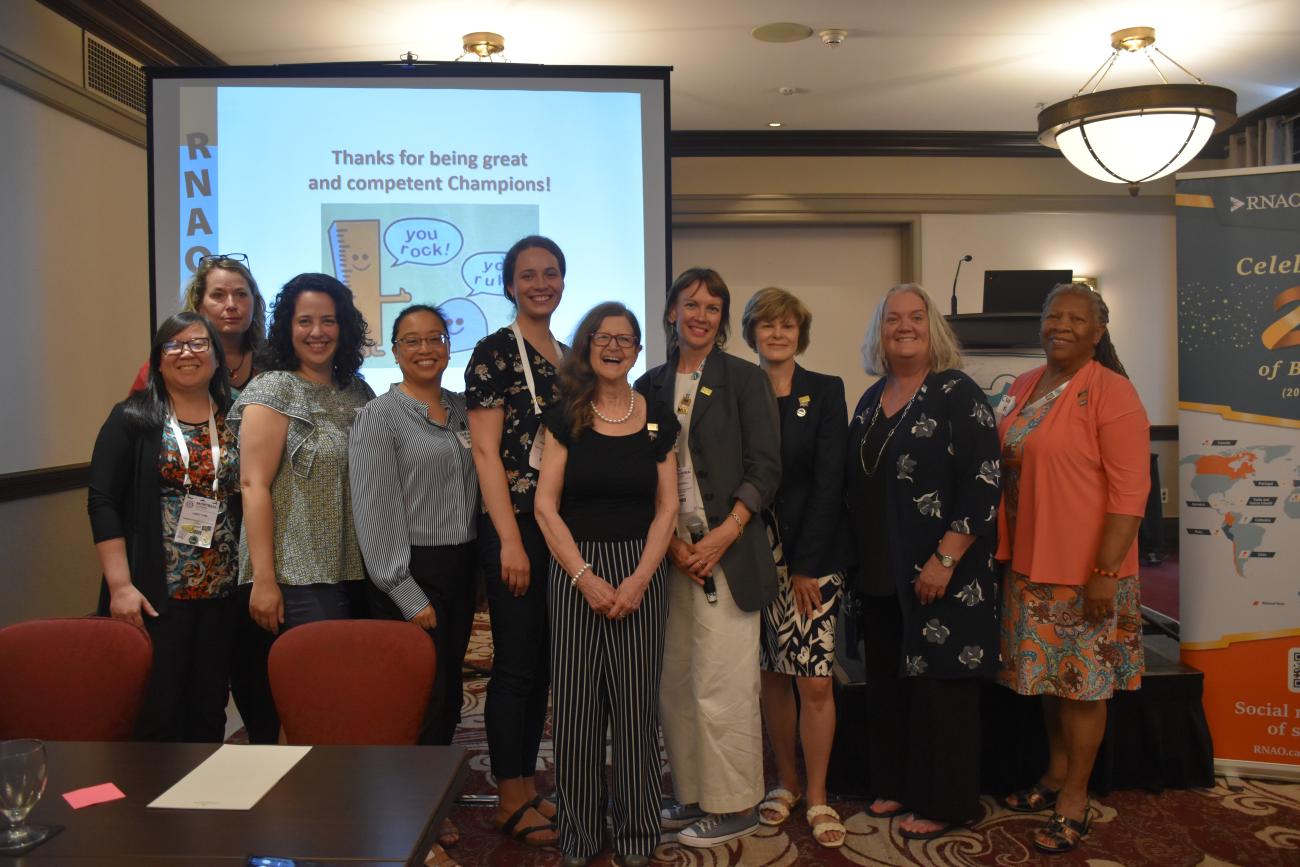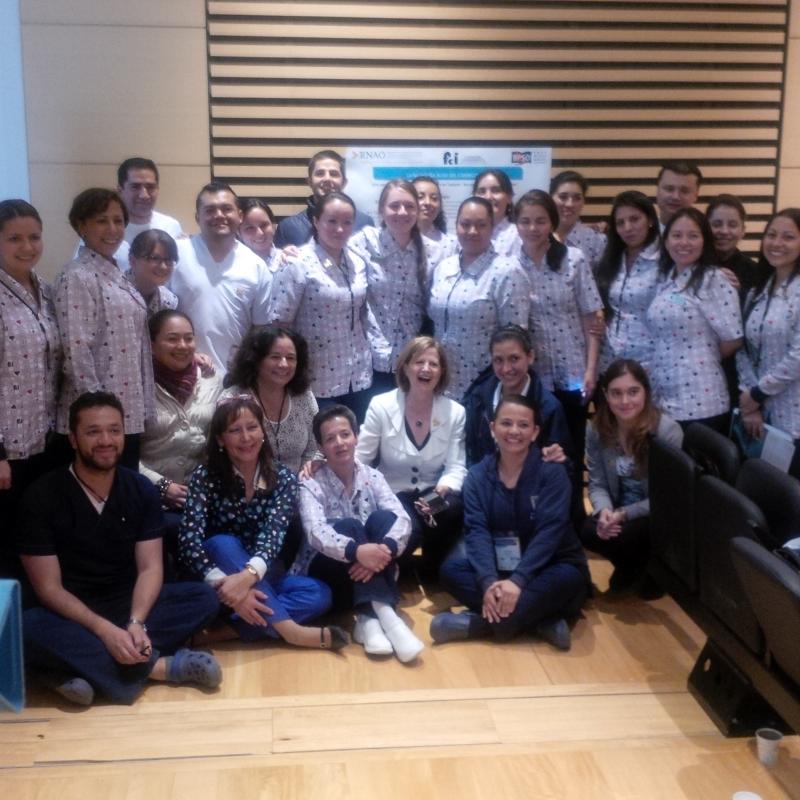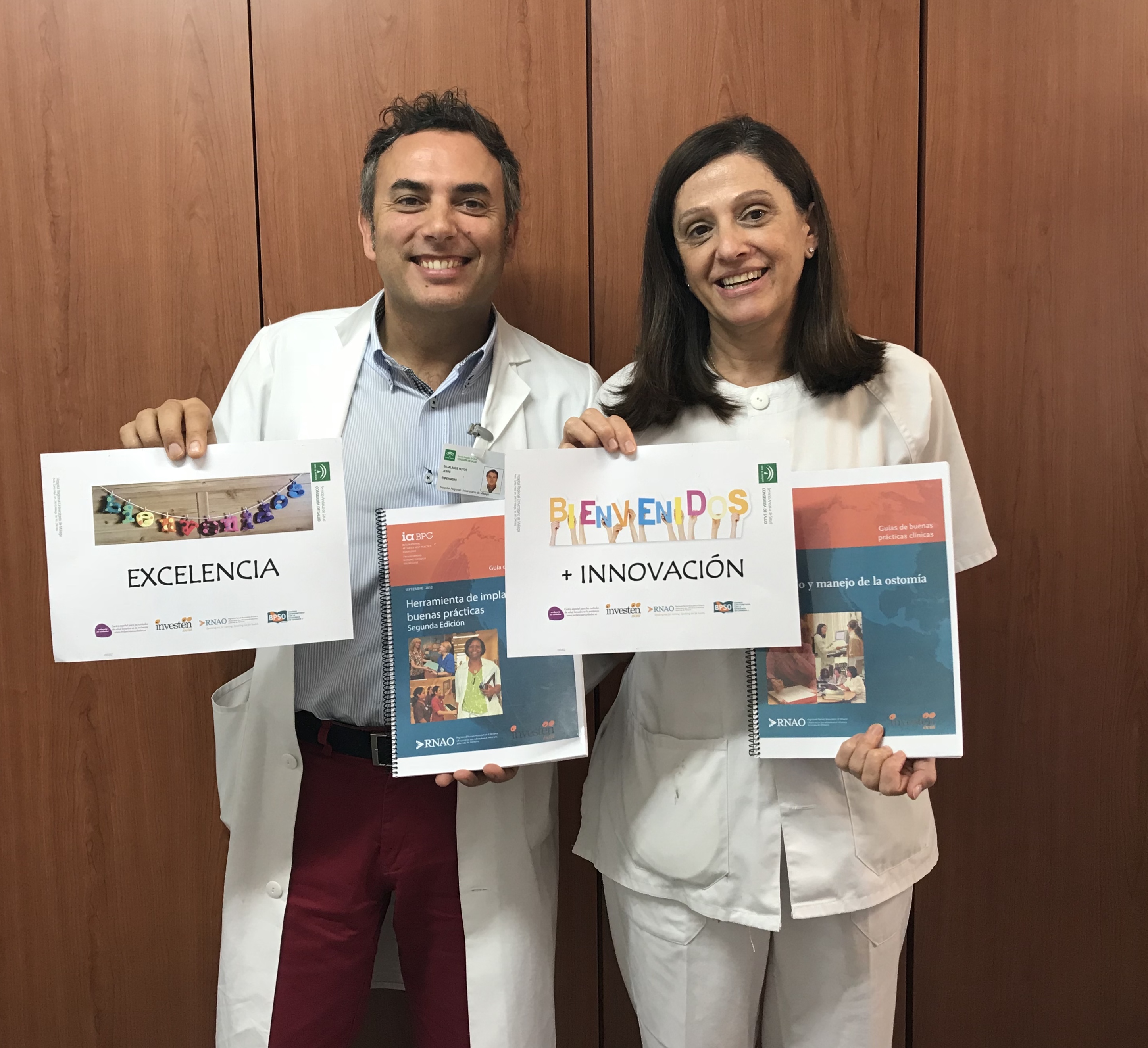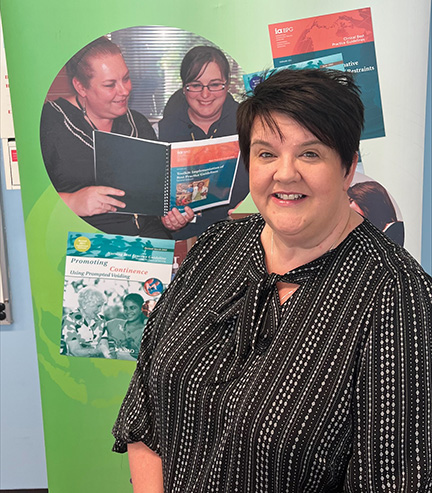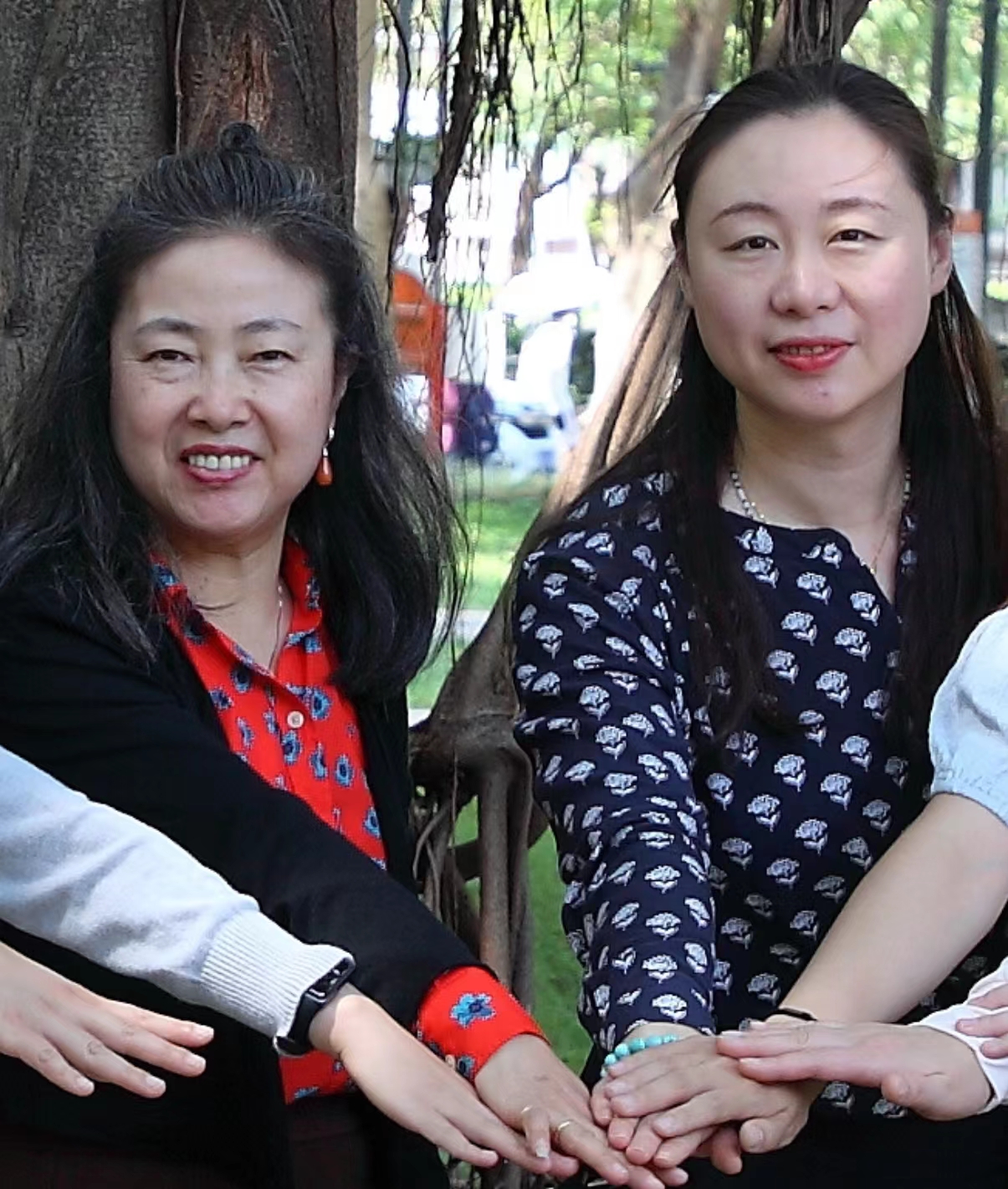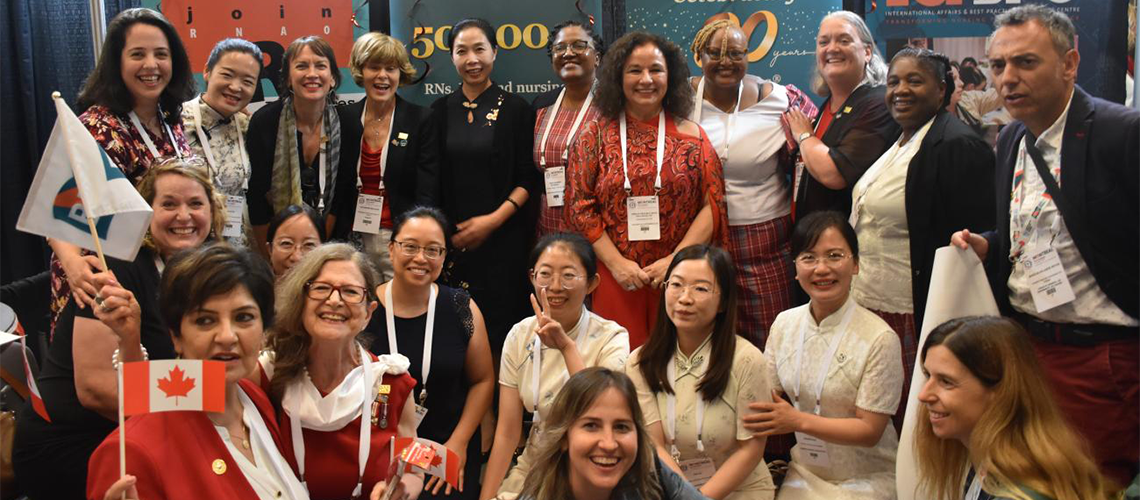
Expanding evidence-based practice to countries around the world didn’t happen overnight. It required a combination of time, serendipity, relationship building and planned change (also known as purposeful evolution), according to Dr. Irmajean Bajnok, former director of the International Affairs and Best Practice Guidelines (IABPG) Centre and a key player in establishing an international presence for RNAO’s Best Practice Spotlight Organization® (BPSO®) program.
Before RNAO welcomed Spain as its first international BPSO in 2010, Bajnok recalls a number of discussions about how to grow the program beyond Canada in a way that would be both manageable and sustainable for the association. At the time, all BPSOs reported to and were supported by RNAO (these are known as BPSO ‘directs’). However, this model wasn’t enough to match the pace of the program’s growth.
“We had to find another way of enabling the international community to benefit from RNAO’s rich knowledge and experience. That’s when (RNAO CEO Dr. Doris Grinspun) shared her vision of developing a vast network of BPSOs supported by RNAO and other, more mature BPSOs through what we now know as the BPSO ‘host’ model. The goal was to provide BPSOs with the tools and resources to facilitate outreach in their own jurisdictions, while also ensuring program fidelity and deliverables,” explains Bajnok.
As these discussions about a new model continued, RNAO got on with the business of supporting its growing roster of BPSO directs. In 2009, the association was hosting its annual BPSO Knowledge Exchange Symposium in Toronto to highlight the work these active organizations were doing. During that event, Grinspun met with Dr. Maria Teresa Moreno-Casbas, the head of Investén-isciii (Unidad de coordinacion y desarrollo de la Investigacion en Enfermeria), Spain’s National Nursing and Healthcare Research Unit. Moreno-Casbas was in Toronto and wanted to meet with Grinspun to explore the opportunity to translate RNAO’s best practice guidelines (BPG) into Spanish.
After an impromptu meeting with Moreno-Casbas, plans were in place to sign an agreement and begin translating all of the BPGs into Spanish, paving the way for a partnership with Investén-isciii (and by association the Spanish government) to become the first international BPSO host, and opening the doors to all Spanish-speaking countries. Grinspun (whose mother tongue is Spanish) and Bajnok held training sessions in Spain. The host model was formally defined. And Investén-isciii welcomed more than 10 directs after receiving overwhelming interest in the program.
Today, Spain has more than 650 BPSOs and counting. “Their commitment, passion and intensity during those early months – and still today – is awe-inspiring…they’ve run with implementation from the very start,” says Grinspun, who serves as their mentor and coach. “Thanks to Investén-isciii and the Spanish government, millions of people around the world who receive care from Spanish speaking health professionals are benefitting from the success of this global program.”
The rapid spread of international BPSOs didn’t stop in Spain.
Backtracking to 2006, RNAO was connected (via a mutual contact in Ottawa) with the owner of a company in China (Beijing Nightingale Consultation of Culture Co. Ltd.) that designed and produced nursing uniforms. The owner wanted to give back to nurses by sponsoring RNAO to provide leadership training for nurses in hospitals across China. Grinspun and Bajnok agreed to facilitate workshops for thousands of nurse executives, incorporating the BPGs as a critical tool to lead.
This early work with nurses in China led to the engagement of Chinese health-care organizations in the BPSO movement. The focus became clinical excellence through implementation of BPGs.
The Beijing University of Traditional Chinese Medicine (BUCM) reached out to RNAO through a nursing graduate student named Shangqian Gao, who has since moved on to Peking University First Hospital. Gao contacted RNAO because he wanted permission to translate the BPG Toolkit into Chinese. And his timing couldn’t have been better. Grinspun and Bajnok, who were on their way to China for another leadership training program, seized the opportunity to work with BUCM to become a BPSO. Gao and another graduate student named Junqiang (John) Zhao were eager to help with the translation and assist colleagues to understand the concept of implementation science.
When Grinspun and Bajnok met with Dr. Hao Yufang, the dean of BUCM’s School of Nursing, during their next visit to China, they were presented with printed proposals for the university to become RNAO’s first international academic BPSO in China. “We were blown away,” says Bajnok. “They were excited…and they even brought professor Gao Ning from Dongzhimen Hospital – one of the largest in Chinese medicine – who was also interested.” In 2015, BUCM and Dongzhimen Hospital signed contracts to become the first BPSO directs in China. “Their work has been stellar, and today both organizations serve as BPSO host leaders in Beijing,” says a proud Grinspun.
Although the differences in language and culture initially caused some challenges, that didn’t hinder the work of the BPSOs, which began to see positive results almost immediately. During the champions training sessions, hosted by Grinspun and Bajnok, the importance of being aware of the context of practice when implementing BPGs was never lost in translation. We always remind champions, “it’s not a cookie cutter approach,” says Bajnok. Adaptability is key to success for any BPSO, regardless of the place they call home.
When they returned to China for an audit and feedback visit about a year later, Bajnok says she and Grinspun “were in awe. It was out of this world how serious they had taken this and how committed they were – and both the hospital and the university were delivering results,” Bajnok says. In addition to improved health outcomes, BPG implementation was also improving the status of and respect for nursing in China. The Chinese government even increased funding to the hospital given the positive, measurable impact of evidence-based care by nurses, she adds.
Fast forward to 2023, and BUCM (an academic BPSO host) and Dongzhimen Hospital (a service BPSO host) now each lead several organizations. Many other organizations across different regions and provinces in China have since taken the steps to become BPSOs, joining China’s dynamic consortium that comes together every three months to share strategies and success stories (read more about consortiums and the different BPSO models).
A triple threat: Ottawa-based hospital assumes three BPSO roles
As a BPSO Direct, BPSO Host and as part of a BPSO Ontario Health Team (OHT), Ottawa’s Hôpital Montfort is one-of-a-kind. In 2009, Montfort began its BPSO journey as a Direct and graduated three years later. Given its positive experience, the BPSO team was eager to mentor and collaborate with other organizations. In 2019, it signed on as RNAO’s inaugural BPSO Francophone Specialty Host and as a BPSO OHT with Archipel (formerly called Ottawa East OHT).
“There’s big pride that comes with knowing we are the first Francophone BPSO in Canada, and we can also support and coach other organizations,” says Judith Makana, one of two BPSO leads for Montfort. Above all else, the opportunity to share knowledge on evidence-based practices with other local and international organizations is most gratifying, she adds.
Montfort received designation as a BPSO Francophone Specialty Host at RNAO’s 2023 Annual General Meeting in June. To date, it has two BPSO Directs: Sensenbrenner Hospital in Kapuskasing, Ontario and Centre Hospitalier Universitaire Vaudois in Lausanne, Switzerland – the first BPSO in that country.
“Right now, it’s about understanding them, knowing them, and trying to adjust and adapt all of the resources we have to respond to their needs,” Makana says of the unique relationship that’s forming with the Switzerland BPSO, which, like Montfort, is an academic hospital. Makana says they have started from a place of understanding even though they are in different parts of the world. “It’s a winning game for the both of us.”
Back at home, and in the role of partner organization with Archipel BPSO OHT, the Montfort team is further engaging with BPGs and working towards a more seamless patient experience in the region it calls home. To date, Archipel has implemented RNAO’s Person- and Family-Centred Care and Engaging Clients Who Use Substances BPGs, and is in the process of implementing Transitions in Care and Services.
“It’s amazing to see that the journey that started a little more than 10 years ago has helped us to connect with other organizations in the country, in the region and also internationally,” Makana says. “A door opened for the Montfort hospital…and we’re lucky to be in this position.”
International expansion of the BPSO program over the last two decades has been growing exponentially, with simultaneous interest and leadership in different countries and on several continents. The Australian Nursing and Midwifery Federation South Australian Branch (ANMF SA) is another trailblazer for BPG implementation outside of Canada, and has been involved since launching a BPG pilot program across three hospital sites in 2012. The organization’s CEO Elizabeth Dabars and then executive director Rob Bonner met with the RNAO team, including Grinspun, to explore the partnership after learning about BPGs and the BPSO program. They were and still are the only union to act as a BPSO host.
During the COVID-19 pandemic, and with the resulting crisis in the aged care system, ANMF SA shifted its focus to long-term care, not only with respect to the care of its aging population, but also in relation to workplace safety for care providers. In addition to helping organizations in this struggling sector implement the Person- and Family-Centred Care BPG, ANMF SA is also focusing its attention on healthy work environment BPGs and the implementation of RNAO’s Workplace Health, Safety and Well-Being of the Nurse BPG.
"The outcomes we have seen since the start of our BPSO journey are significant and have benefitted many within our communities across the state,” says Dabars. “Implementing research is highly important…and we are pleased that the RNAO programs support this and encourage practice changes that are sustainable and provide measurable improvements for all involved.”
In July 2023, ANMF SA joined representatives from four other international BPSOs to share details about their experiences at a BPSO special session during the International Council of Nurses (ICN) Congress in Montreal. The all-day special session, which was held immediately following the congress, was an opportunity to focus on celebrating the global commitment of BPSOs to evidence-based cultures. The panel, which featured panelists from Canada, Chile, China and Spain, was moderated by Grinspun and preceded an afternoon of sessions for existing BPSOs to strategize, network and build new competencies.
“Being from different parts of the world energizes and strengthens the pursuit of evidence-based practice and the formation of a collective identity for BPSOs,” says Grinspun. “Together, we are thriving as a social movement of science, like no other.”
Remarks from some of the BPSO special session panelists
Dr. Amalia Silva
Universidad de Chile/University of Chile
Academic BPSO host (graduated 2023) and BPSO direct (graduated 2015)
The university’s involvement with BPSO has strengthened academic qualifications, improved learning experiences for students, developed lines of research, and generated partnerships that have supported the national and international nursing discipline, Silva says. The program is a “social movement…(that has had) a significant impact in Chile by adding evidence from a care perspective, which is the core focus of nursing.” Many universities in Chile and other Latin American countries have expressed interest in working with Universidad de Chile to implement guidelines, which Silva says solidifies the position of BPGs in the global nursing community.
Jesús Bujalance Hoyos
Hospital Regional Universitario de Málaga, Spain
BPSO direct (graduated 2021)
“We have more than 400 nurses who are champions in the program and are the essence of it,” says Bujalance Hoyos. “One of the greatest achievements of BPSO is nurses’ active participation in their roles of clinical leadership and training other nurses.” Sharing the hospital’s success as a BPSO with others using social media (e.g., X, formerly Twitter) “accelerates organizational change” and “supports the credibility of the change, since nurses, patients and the organization itself can publicly visualize all of the changes occurring,” thanks to BPG implementation.
Nicola Williams
Australian Nursing and Midwifery Federation South Australian Branch (ANMF SA)
BPSO host (graduated 2015)
Implementing RNAO’s Workplace Health, Safety and Well-Being of the Nurse BPG has been eye-opening, says Williams: “The staff (in the aged care sector) are experiencing an unparalleled level of stress and fatigue and are so ready for any help and for change to make things better.” This project has "...really cemented the importance of having a healthy work environment to protect not only the staff but the residents as well...if the staff are happy, then the continuity and the quality of care improves.”
Tian Runxi
Dongzhimen Hospital, China
Service BPSO host (graduated 2018)
International events allow staff from Dongzhimen Hospital to network with BPSOs from other countries and introduce them to traditional Chinese medicine hospitals and nursing, which has been meaningful to Runxi. Dongzhimen Hospital has a close relationship with BUCM’s School of Nursing for BPG implementation. The university teaches the guidelines in curricula and conducts academic research on outcomes. They also provide guidance to the hospitals, Runxi explains. The guidelines are then applied in hospitals, and “together we organize evidence-based training with the university…so that more hospitals and nurses in China can learn about BPSO and RNAO.”
There are currently more than 1,500 BPSOs in Ontario, across Canada, and in countries such as Chile, China, Colombia, Italy, Jamaica, Peru, Philippines, Portugal, Qatar, Spain, Switzerland and Turks and Caicos Island (explore the geospatial map here). At the ICN Congress this year (the event happens every two years), Heather McConnell, director of the IABPG Centre, saw firsthand the crowds that gathered at RNAO’s booth and during the special session. “RNAO was a positive force and magnate, drawing nurses from around the world who were inspired that they too could become involved,” she says.
“When different people from different countries can really align with each other based on their belief in evidence-based practice and how you go about making it happen – that is a social movement,” McConnell says. “I don’t think it could stop even if we wanted it to because it’s its own movement now…and it’s making a difference.”
“It’s exciting and very meaningful to see organizations around the globe embrace BPGs and the BPSO social movement of science,” Grinspun says. “That was the vision in the early days, and it’s inspiring to see how far we’ve come in 20 years.”


